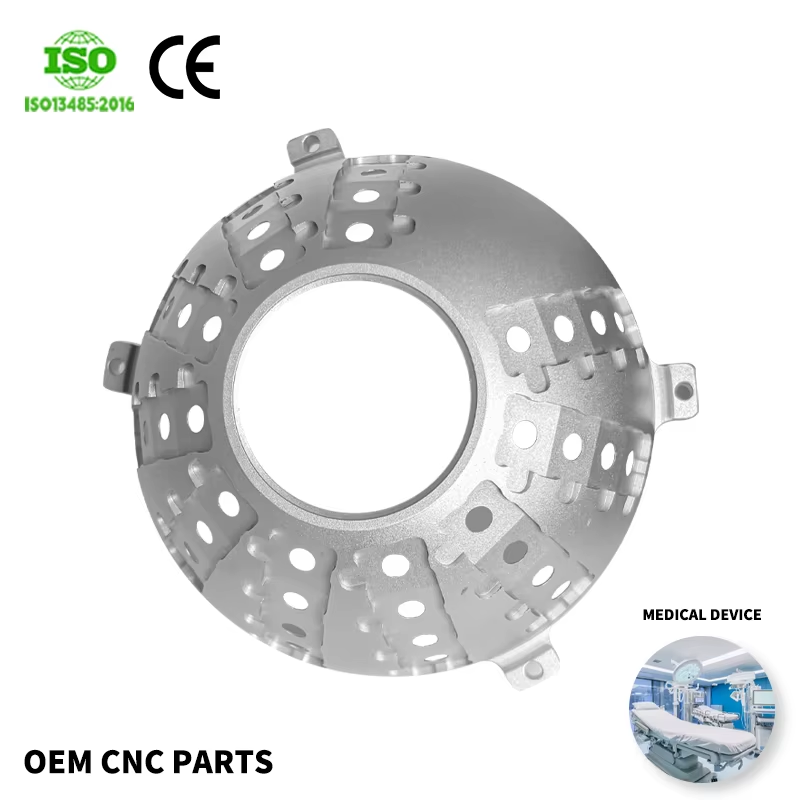Understanding CNC Milling Parts and Their Role in Manufacturing
What Are CNC Milling Parts
The CNC milling parts are essential components produced through the sophisticated process of computer numerical control (CNC) machining. This technology allows for the meticulous crafting of complex and precise parts from a range of materials like metal, plastic, and wood. It is this versatility and precision that makes these parts indispensable in industries such as aerospace, automotive, and medical device manufacturing. For instance, the aerospace sector relies on CNC milling for creating vital components that meet high safety and performance standards. Furthermore, CNC machining technology is known for its ability to produce parts with high repeatability and exceptional accuracy, thereby fulfilling the stringent requirements observed in industries today.
Key Applications in Modern Industries
CNC milling parts find extensive application across various modern industries. In the aerospace sector, the precision offered by CNC milling is paramount; it is employed in the creation of aircraft components, such as brackets and housings, where even the smallest deviation can impact safety and performance. Moving to the automotive industry, CNC milling is integral in manufacturing engine blocks, transmission cases, and other components that demand robustness and durability. This technology ensures parts meet the high-performance standards needed for automotive applications. Moreover, the medical industry leverages CNC milling to fabricate surgical instruments and implants, underlining the importance of precision and dependability in healthcare where the stakes are undeniably high. It's clear that in sectors requiring utmost accuracy, CNC milling parts are critical.
Initial Investment Costs for CNC Milling Technology
Breakdown of Upfront Equipment Expenses
The initial investment in CNC milling technology can pose a significant budgetary requirement, with costs typically ranging from tens of thousands to several hundred thousand dollars. This variation depends largely on the capabilities, size, and brand of the machine. For instance, a basic CNC milling machine may suffice for less complicated tasks, whilst high-end machines equipped with advanced technology and features can command a much higher price. The choice of machine must align with business needs, factoring in its specific technical specifications. Beyond the machine itself, additional expenses must be considered, including necessary tools, specialized software for design and control operations, and other essential equipment critical for an efficient setup and smooth operation process.
Machine Setup and Programming Fees
In addition to the purchase price, setting up a CNC milling machine entails further costs. Companies must budget for setup fees, often involving skilled technicians to ensure that machinery operates at optimal performance levels. Precision in operation is crucial, and professional setup services help guarantee this. Additionally, businesses may incur programming fees if they outsource the creation of CNC operation files. These tailored programs, essential for guiding machine operations, reflect specialized costs in their own right. Training staff to proficiently operate and maintain CNC milling machines further adds to the initial investment, but this expenditure is essential. Proper training not only ensures efficient machinery use but also minimizes the risk of costly errors in manufacturing processes.
Long-Term Financial Benefits of CNC Milling Investment
Reduced Labor Costs Through Automation
Investing in CNC milling technology allows businesses to automate production processes, leading to significant labor cost savings by reducing the need for manual intervention. This shift not only enhances overall production speed but also increases labor efficiency by allowing CNC machines to run continuously with minimal downtime. According to the National Association of Manufacturers, automation in machining can cut labor costs by as much as 20%. Such automation is particularly crucial as it addresses the looming labor shortages in the manufacturing sector, enabling companies to maintain output levels with fewer workers.
Minimized Material Waste and Operational Savings
CNC milling technology excels in minimizing material waste due to its precision machining capabilities, which is vital for cost management. Unlike traditional machining methods, CNC milling optimizes cutting paths and utilizes tools more effectively, resulting in better material utilization and reduced waste. This precision allows businesses to save an estimated 15-30% in material costs over time. As a result, companies can achieve significant operational savings, making CNC technology an attractive investment. Additionally, detailed analysis of waste statistics provides insights into further efficiency improvements, ensuring that materials are used optimally in production processes.
Enhancing Production Speed and Output
CNC milling significantly enhances production speed, allowing for the quick execution of complex tasks that would otherwise take much longer with manual methods. These machines operate continuously with minimal downtime, ensuring businesses can meet high-demand periods efficiently while maintaining quality. A report indicates that manufacturers leveraging CNC machinery have experienced up to a 50% increase in production levels. This incredible boost in output is often attributed to the precision and automation capabilities of CNC machines, which streamline operations and lead to faster turnaround times.
Flexibility for Complex Part Manufacturing
CNC milling provides unprecedented flexibility in producing complex parts with intricate designs, making it ideal for customized manufacturing needs. This versatility allows industries requiring specialized components to diversify their product offerings without the need for excessive investment in multiple machines. The ease with which CNC machines switch between different part designs highlights their highly adaptive nature, catering to varying client requirements seamlessly. This capability leads to a more efficient manufacturing process, reflecting the industry's shift toward customization and precision manufacturing with CNC Milling Parts.
Precision and Quality: The Competitive Edge of CNC Milling
Achieving Tight Tolerances Consistently
One of the standout advantages of CNC milling is its capability to achieve tight tolerances consistently, vital for high-quality manufacturing and adherence to industry standards. With precision often measured in microns, CNC technology ensures that even the most intricate details are executed with perfection, crucial for components where reliability is non-negotiable. This remarkable degree of accuracy not only enhances the competitive edge of businesses focusing on premium production quality but also establishes them as leaders within the market. Embracing CNC machining means businesses can regularly produce parts that meet the exact specifications demanded by industries, ranging from aerospace to electronics, where precision is paramount.
Impact on Product Reliability and Brand Reputation
The consistent quality of CNC-milled parts greatly bolsters product reliability, which is essential in maintaining and enhancing brand reputation in competitive markets. A reputation for producing reliable, high-quality products can significantly boost customer loyalty and result in increased repeat business, further driving long-term profit margins. Numerous industry leaders have highlighted that the meticulous quality control achievable through CNC technology is a significant differentiator in securing customer trust. By consistently delivering products that meet or exceed expectations, companies can carve out a reputation of reliability, paving the way for sustained business growth and market leadership.
CNC machining ensures that businesses not only meet existing standards but also adapt flexibly to future demands by producing quality parts reliably and precisely.

Conducting a Comprehensive Cost-Benefit Analysis
Key Metrics for Evaluating ROI
To accurately assess the profitability of CNC milling investments, one must conduct a thorough cost-benefit analysis focusing on key metrics like Return on Investment (ROI), payback period, and total cost of ownership. Monitoring these metrics offers a comprehensive understanding of the financial implications of implementing CNC technology. It is essential to track production costs closely, identify labor savings, and evaluate any potential downtime reduction. By understanding these elements, businesses can truly appreciate the cost advantages that CNC technology offers. Industry benchmarks serve as a valuable resource, helping set realistic ROI expectations and aiding in informed decision-making processes concerning CNC investments.
When CNC Milling Becomes a Strategic Advantage
CNC milling transforms into a strategic advantage when it aligns seamlessly with business objectives of quality, efficiency, and scalability. This alignment allows companies to outperform competitors by enhancing market competitiveness. Recognizing market demands plays a vital role in determining when to invest in CNC technology, particularly in fast-evolving industries. Case studies have highlighted that firms effectively leveraging CNC milling often experience significant improvements in both market share and customer satisfaction. This strategic positioning fosters an environment conducive to long-term success and sustainability in a competitive landscape. By understanding the strategic benefits associated with CNC milling, businesses can make informed decisions that position them advantageously within their respective markets.
FAQ Section
What materials can be used in CNC milling?
CNC milling is versatile and can handle a wide range of materials including metals, plastics, and wood.
How does CNC milling improve production speed?
CNC milling automates processes, allowing machines to operate continuously with minimal downtime, thus enhancing production speed.
Why is CNC technology critical in the aerospace industry?
The aerospace industry demands high precision and reliability, which CNC milling provides by crafting components with exact tolerances.
What are the financial benefits of CNC milling in the long term?
Over time, CNC milling reduces labor and material costs through automation and precision, contributing to significant financial savings.
Is CNC milling suitable for complex part manufacturing?
Yes, CNC milling is ideal for producing complex, intricate designs thanks to its precision and flexibility.
Table of Contents
- Understanding CNC Milling Parts and Their Role in Manufacturing
- Long-Term Financial Benefits of CNC Milling Investment
- Enhancing Production Speed and Output
- Flexibility for Complex Part Manufacturing
- Precision and Quality: The Competitive Edge of CNC Milling
- Conducting a Comprehensive Cost-Benefit Analysis
- FAQ Section

